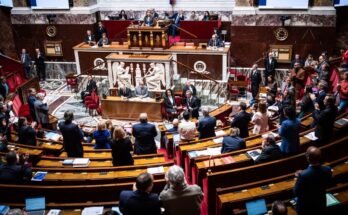There has been speculation for months that even the Independent State of Bavaria would not be able to manage without new debt in its 2026/27 dual budget given the overall economic situation; Prime Minister Markus Söder (CSU) has also prepared his citizens carefully for this. The latest tax estimates, which turned out to be better than expected, provide reassurance. But Finance Minister Albert Füracker (CSU) tempered those expectations: “There is no reason for euphoria”. So it was at least a small surprise when Söder announced on Tuesday after a Council of Ministers budget meeting that “the whole world” might go into debt, but Bavaria would not.
And not only that: the double budget with total expenditure of 168 billion euros includes investment expenditure of 28.6 billion euros. This equates to a rate of 17 percent – “an investment record,” said CSU chairman Söder. This also includes the five billion that the Free State forwarded to Bavarian municipalities from federal funds – “special infrastructure and climate neutrality funds” (“municipal-related measures”), as well as the two billion that remained in the Free State.
Does not reduce art and culture
The focus should be on investing in research, and billions more should be poured into the high-tech agenda. In general, research and education constitute the largest expenditure, amounting to almost 60 billion euros. Söder called childcare another priority. These are “hard location factors,” which are important not only for families, but also for the economy and workforce.
But massive savings will also have to be made, totaling almost two billion euros. Not with arts and culture, Söder insists, and not with climate protection either: Rather with the state. There should be no new jobs in ministries and State Chancelleries in 2026 and 2027; by 2028, 1,000 jobs will be cut across all areas of business. The exceptions are in the core areas of state administration: security and education, for example police officers and teachers. From 2027 onwards there will be 1,500 new positions for teachers. However, the possibility of working part-time is limited.
Now, this can only be done until the child is 14 years old, and no longer, as before, until the child is 17 years old. A minimum part-time quota of 30 people, instead of the previous 20, now applies. In terms of “migration costs”, such as refugee accommodation, more than 800 million euros will be saved thanks to “the success of jointly supported policies in Berlin and Munich” – but the 5.3 billion euro figure now estimated is “still too much”, according to the deputy prime minister and chairman of the Free Voters, Hubert Aiwanger.
Nearly five billion of reserves
The biggest change in the budget was marked by the elimination of the family allowance for children born from January 1 2025. The plan so far is to change the monthly allowance for two- and three-year-old children, which is only available in Bavaria, to a one-time payment and thereby reduce it to 3,000 euros, half the previous total. The funds released must be used to support the operational costs of kindergartens and daycares. This is what should happen now with all that money.
Only when asked did Füracker say that 4.9 billion would be taken from reserves. But there is still another billion remaining – and this number could be increased further. Bavaria definitely has room for new debt. Legally, a loan of around 2.3 billion euros could be granted. But Füracker referred to interest charges he wanted to avoid.
Söder emphasized that a balanced budget is not the ultimate goal. However, at the same time, he places himself in a historical line of Bavarian budgetary discipline that is particularly associated with the name of the former Prime Minister. “Stoiber’s legacy will be preserved,” said Söder. This is true despite equalization of state finances, with Bavaria paying almost ten billion by 2024.



